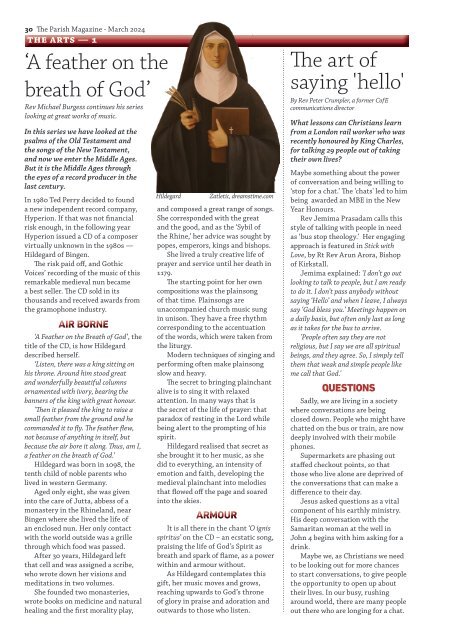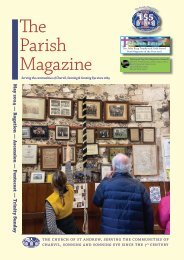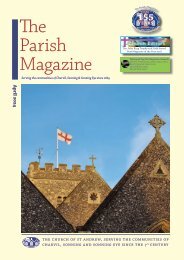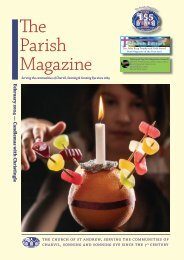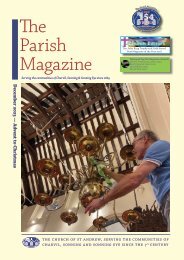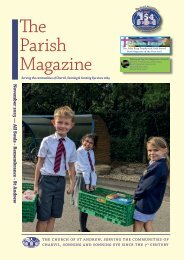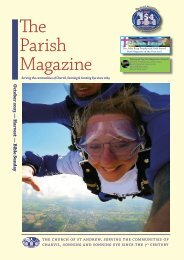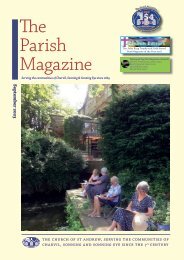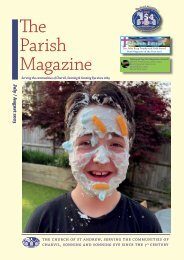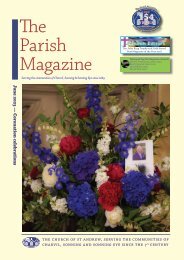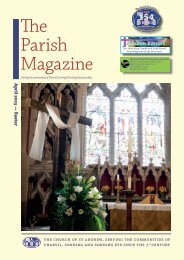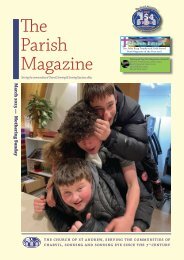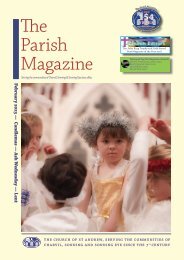The Parish Magazine March 2024
Serving the Communities of Charvil, Sonning, and Sonning Eye since 1869
Serving the Communities of Charvil, Sonning, and Sonning Eye since 1869
Create successful ePaper yourself
Turn your PDF publications into a flip-book with our unique Google optimized e-Paper software.
30 <strong>The</strong> <strong>Parish</strong> <strong>Magazine</strong> - <strong>March</strong> <strong>2024</strong><br />
THE ARTS — 1<br />
‘A feather on the<br />
breath of God’<br />
Rev Michael Burgess continues his series<br />
looking at great works of music.<br />
In this series we have looked at the<br />
psalms of the Old Testament and<br />
the songs of the New Testament,<br />
and now we enter the Middle Ages.<br />
But it is the Middle Ages through<br />
the eyes of a record producer in the<br />
last century.<br />
In 1980 Ted Perry decided to found<br />
a new independent record company,<br />
Hyperion. If that was not financial<br />
risk enough, in the following year<br />
Hyperion issued a CD of a composer<br />
virtually unknown in the 1980s —<br />
Hildegard of Bingen.<br />
<strong>The</strong> risk paid off, and Gothic<br />
Voices’ recording of the music of this<br />
remarkable medieval nun became<br />
a best seller. <strong>The</strong> CD sold in its<br />
thousands and received awards from<br />
the gramophone industry.<br />
AIR BORNE<br />
‘A Feather on the Breath of God’, the<br />
title of the CD, is how Hildegard<br />
described herself.<br />
‘Listen, there was a king sitting on<br />
his throne. Around him stood great<br />
and wonderfully beautiful columns<br />
ornamented with ivory, bearing the<br />
banners of the king with great honour.<br />
'<strong>The</strong>n it pleased the king to raise a<br />
small feather from the ground and he<br />
commanded it to fly. <strong>The</strong> feather flew,<br />
not because of anything in itself, but<br />
because the air bore it along. Thus, am I,<br />
a feather on the breath of God.’<br />
Hildegard was born in 1098, the<br />
tenth child of noble parents who<br />
lived in western Germany.<br />
Aged only eight, she was given<br />
into the care of Jutta, abbess of a<br />
monastery in the Rhineland, near<br />
Bingen where she lived the life of<br />
an enclosed nun. Her only contact<br />
with the world outside was a grille<br />
through which food was passed.<br />
After 30 years, Hildegard left<br />
that cell and was assigned a scribe,<br />
who wrote down her visions and<br />
meditations in two volumes.<br />
She founded two monasteries,<br />
wrote books on medicine and natural<br />
healing and the first morality play,<br />
Hildegard<br />
Zatletic, dreamstime.com<br />
and composed a great range of songs.<br />
She corresponded with the great<br />
and the good, and as the ‘Sybil of<br />
the Rhine,’ her advice was sought by<br />
popes, emperors, kings and bishops.<br />
She lived a truly creative life of<br />
prayer and service until her death in<br />
1179.<br />
<strong>The</strong> starting point for her own<br />
compositions was the plainsong<br />
of that time. Plainsongs are<br />
unaccompanied church music sung<br />
in unison. <strong>The</strong>y have a free rhythm<br />
corresponding to the accentuation<br />
of the words, which were taken from<br />
the liturgy.<br />
Modern techniques of singing and<br />
performing often make plainsong<br />
slow and heavy.<br />
<strong>The</strong> secret to bringing plainchant<br />
alive is to sing it with relaxed<br />
attention. In many ways that is<br />
the secret of the life of prayer: that<br />
paradox of resting in the Lord while<br />
being alert to the prompting of his<br />
spirit.<br />
Hildegard realised that secret as<br />
she brought it to her music, as she<br />
did to everything, an intensity of<br />
emotion and faith, developing the<br />
medieval plainchant into melodies<br />
that flowed off the page and soared<br />
into the skies.<br />
ARMOUR<br />
It is all there in the chant ‘O ignis<br />
spiritus’ on the CD – an ecstatic song,<br />
praising the life of God’s Spirit as<br />
breath and spark of flame, as a power<br />
within and armour without.<br />
As Hildegard contemplates this<br />
gift, her music moves and grows,<br />
reaching upwards to God’s throne<br />
of glory in praise and adoration and<br />
outwards to those who listen.<br />
<strong>The</strong> art of<br />
saying 'hello'<br />
By Rev Peter Crumpler, a former CofE<br />
communications director<br />
What lessons can Christians learn<br />
from a London rail worker who was<br />
recently honoured by King Charles,<br />
for talking 29 people out of taking<br />
their own lives?<br />
Maybe something about the power<br />
of conversation and being willing to<br />
‘stop for a chat.’ <strong>The</strong> 'chats' led to him<br />
being awarded an MBE in the New<br />
Year Honours.<br />
Rev Jemima Prasadam calls this<br />
style of talking with people in need<br />
as ‘bus stop theology.’ Her engaging<br />
approach is featured in Stick with<br />
Love, by Rt Rev Arun Arora, Bishop<br />
of Kirkstall.<br />
Jemima explained: 'I don’t go out<br />
looking to talk to people, but I am ready<br />
to do it. I don’t pass anybody without<br />
saying ‘Hello’ and when I leave, I always<br />
say ‘God bless you.’ Meetings happen on<br />
a daily basis, but often only last as long<br />
as it takes for the bus to arrive.<br />
'People often say they are not<br />
religious, but I say we are all spiritual<br />
beings, and they agree. So, I simply tell<br />
them that weak and simple people like<br />
me call that God.'<br />
QUESTIONS<br />
Sadly, we are living in a society<br />
where conversations are being<br />
closed down. People who might have<br />
chatted on the bus or train, are now<br />
deeply involved with their mobile<br />
phones.<br />
Supermarkets are phasing out<br />
staffed checkout points, so that<br />
those who live alone are deprived of<br />
the conversations that can make a<br />
difference to their day.<br />
Jesus asked questions as a vital<br />
component of his earthly ministry.<br />
His deep conversation with the<br />
Samaritan woman at the well in<br />
John 4 begins with him asking for a<br />
drink.<br />
Maybe we, as Christians we need<br />
to be looking out for more chances<br />
to start conversations, to give people<br />
the opportunity to open up about<br />
their lives. In our busy, rushing<br />
around world, there are many people<br />
out there who are longing for a chat.


